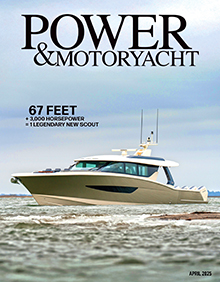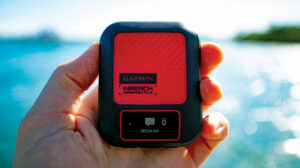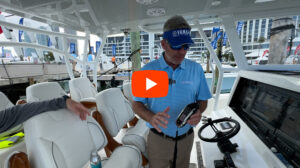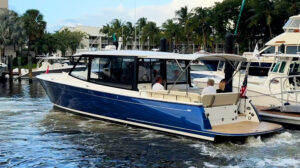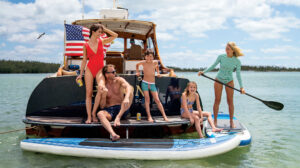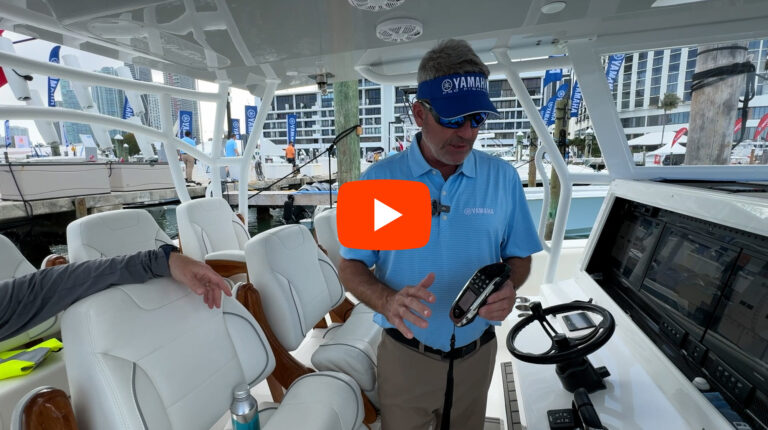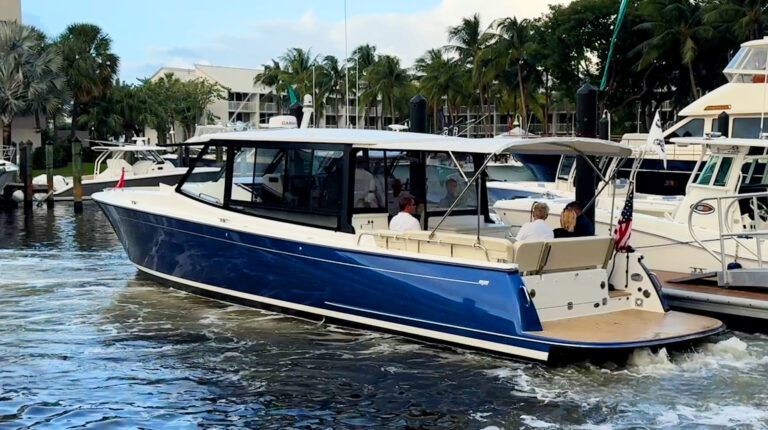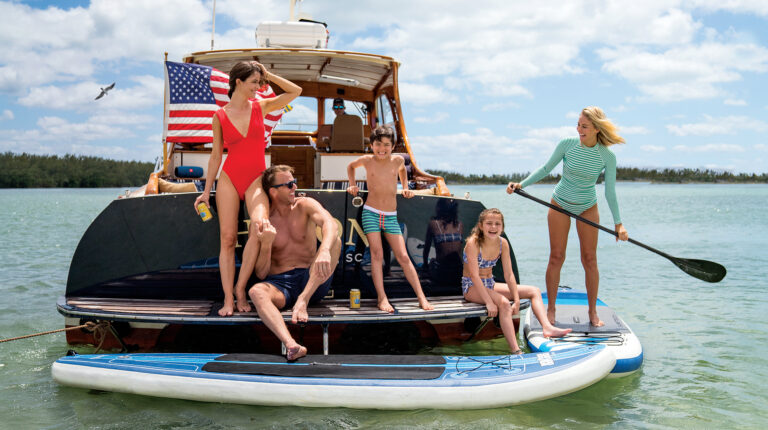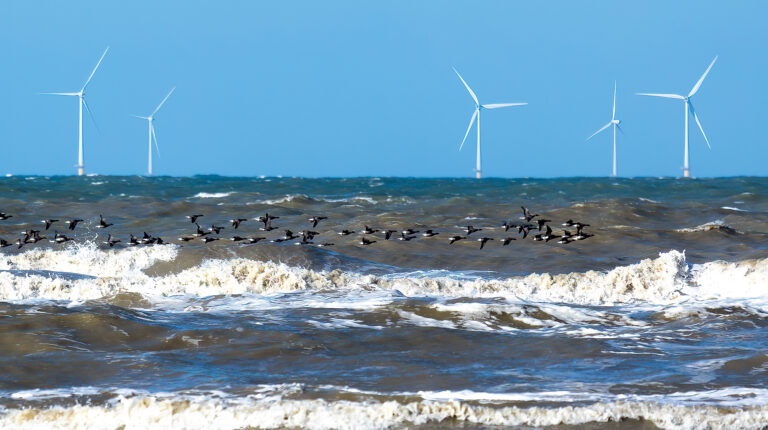
A 75-footer heading from Naples, Florida, to the Bahamas stopped for what promised to be a relaxing night in Miami. The seven guests onboard—five college-age passengers, the vessel’s owner, and his wife—kicked back and enjoyed a few cocktails. Everyone relaxed.
Four hours later, the scene onboard was anything but calm. A massive fire had spread throughout the vessel, forcing five of the seven guests to escape through the main saloon, many of them suffering from various fractures, cuts, and burns. The other two passengers awoke to find themselves trapped in a stateroom with only one small port-hole as the fire began to spread through the below decks common area. Desperate, they got into the shower and doused themselves in the hopes that they could run through the growing flames. When that failed, they returned to their room and began frantically waving their arms through the tiny porthole, hoping that someone would see them. Fortunately—perhaps miraculously—nearby firemen were able to board a boat just small enough to fit between the yacht’s bow and bow piling, cut a hole in the hull, and pull the remaining guests out just before the boat sank. Though there are reports that a cigarette may have been the culprit, the cause of the fire was never officially determined.
There is a moral to this story, but it’s not that boating is dangerous, or that smoking’s bad for you, or anything else along those lines. It has to do with the fact that for all the bells and whistles that were onboard that relatively new, $5 million yacht, there were no smoke alarms. Capt. John McDevitt—who among other things works in sales and service for Bluewater Yacht Sales and consults private clients on boat solutions—was the man responsible for telling me this cautionary tale. And according to him, the moral is clear: had the boat been equipped with smoke alarms, “the guests probably would’ve been able to grab a fire extinguisher or a garden hose and put the fire out themselves a couple of hours before.”
To say that McDevitt has an interest in marine fire safety is like saying that The Beatles were a somewhat popular band. Indeed, to talk to him only once is to understand that here is a man who is deeply passionate about fire protection. “I was raised in a family with firefighters on both my mother’s and father’s side,” McDevitt offers by way of explanation, “so at family picnics, that’s what I was hearing about.” He joined his local fire company, just outside of Philadelphia, at age 16 and eventually worked his way up from firefighter to deputy fire chief. McDevitt even earned an associate’s degree in fire protection, a field he is at pains to describe as encompassing not just fire fighting, but also prevention, egress, detection, and fire suppression.
But McDevitt’s not just a fire guy; the 100-ton licensed captain is also a longtime boater, having bought his first vessel in the mid 1980’s. When he went to take his family for their first overnight stay, he was surprised to find that his boat lacked fire alarms (he installed his own). And though it would take several more years before he began campaigning for marine fire protection in earnest, when he did, his interest quickly turned into a passion.
In 2002, McDevitt—by then the proud bearer of six ABYC certifications—joined the National Fire Protection Association (NFPA)’s 302 Watercraft committee and soon suggested that it look into the mandatory addition of smoke alarms on recreational vessels. The proposal was met with much initial resistance. McDevitt explains that one of the chief reasons was the lack of hard data. “We don’t have the numbers,” he says. To wit, the U.S. Coast Guard’s annual Boating Safety Statistics Report—the main source of information regarding boat-related fires—only provides statistics on open-water incidents, not those that take place at a marina. That’s why the 2008 report recorded only 239 fires among some 13,000,000 registered boats. “What that information tells us,” McDevitt says, “is that boating is basically the safest thing we can do [in terms of fires]. And that’s just not true.”
Another factor behind the NFPA committee’s initial resistance had to do with the fact that Underwriters Laboratories, which describes itself as “an independent product-safety certification organization that has been testing products and writing standards for safety for more than a century,” had not yet certified any models that were specified for use in the marine environment. However, after taking a closer look at the offerings on the market, NFPA committee members—who eventually voted 17 to three in favor of requiring fire alarms onboard recreational vessels—argued that RV fire alarms can, in fact, stand up in a marine environment where moisture and humidity are rampant. McDevitt hastens to add that any home alarms, if installed in the correct places, should also suffice, arguing that at the very least, they are better than having no smoke alarms at all.
Certainly, the issues surrounding marine fire protection and its regulation are fraught with all manner of complexities and implications, and the somewhat shocking fact remains that many marine associations still do not require the installation of smoke alarms. (For his part, McDevitt stresses that he is not in favor of an increase in government regulation, but rather industry and association-specific measures.) And while it’s an area that absolutely demands more attention from any number of groups, the thing I’m most struck by is this: Prior to my conversations with McDevitt, marine fire protection was not something I’d thought about. Ever. Not once, while checking out a boat for PMY or staying on a friend’s vessel, had it occurred to me to check for fire alarms. And while the fault is entirely my own, McDevitt assures me that I am by no means alone. “We’re so used to living in a world where there are smoke alarms everywhere we go,” he says, “we just don’t think to look for them.”
The good news is, it’s both an easy fix and a relatively inexpensive one. Just pick up one of the many smoke alarm models on the market (again, keeping in mind that RV offerings, which typically run from $20 and up, are preferable) and stick them in your boat. McDevitt recommends that you install alarms on every level of your vessel and on every side of a closed door. It is particularly important, he cautions, to put smoke alarms both in and outside rooms that only have small portholes, like on that 75-footer. He also suggests installing small ones near shore-power connections and close to your washer and dryer, likely locations for electrical fires (according to statistics from BoatUS, 55 percent of all onboard fires are electrical in terms of their origin). Finally, McDevitt advocates changing your smoke alarms’ batteries at the start of every boating season and replacing your units every five years. “Detection,” he says “is the biggest shortcoming we have.”
Another recommendation McDevitt makes is that the proactive boat owner start every season by conducting a “fire-protection evaluation.” This means ensuring you have more than the Coast Guard’s minimal hand-held extinguisher requirement. (The Coast Guard only mandates that you have a “B” extinguisher for use on flammable and combustible luquid fires, but McDevitt says that you really need an “A-B-C” model that will work on all kinds of fires, including those that are electrical in nature and those related to typical combustibles like wood, plastics, etc.) It also means checking all of your extinguishers to make sure the gauges are reading within the safe range and that there’s no rust around the bottom of the cylinder. Next and perhaps most important, is instituting a fire-escape plan. Make sure you, your family, and your guests, are aware of all the exits onboard and that you can easily reach and open them. McDevitt recommends walking through your boat and asking questions like, “Can you get out of the boat if the normal exit is blocked by fire? Can hatches be reached? Do they easily open?”
Finally, McDevitt suggests taking a close look at the fixed fire extinguishing system set up in your engine room. According to the Coast Guard, 90 percent of all fires that start while a vessel is underway begin here. Often fixed engine room extinguishers aren’t installed correctly, which means that by the time they sense a fire, it has already begun to spread—a situation that can be compounded by the presence of newer diesel engines, which increase the turn-over rate of ambient air in the room, keeping the temperature from rising quickly and promptly activating the system. Take a look and make sure your fixed fire extinguishing equipment is correctly installed. If you have any questions or concerns, contact your boat’s builder right away.
As I near the end of this story, I can almost hear Capt. McDevitt in my ear, telling me that I’ve missed the point—that there’s so much more to the issue. He’d be right, of course. There are all kinds of problems surrounding marine fire safety: we don’t have accurate numbers, our agencies are reluctant to enforce changes based on the scant information that’s available, and the lack of egress options on many vessels is a real problem. Those, however, are problems for another article. For this one, in this issue dedicated to upgrades, the key point is that if you want to stay safe, you must install smoke alarms on your boat. It might be the most important installation you ever do.
This article originally appeared in the May 2010 issue of Power & Motoryacht magazine.

